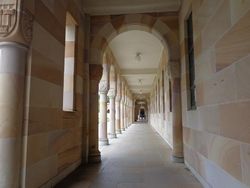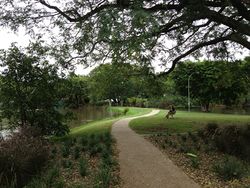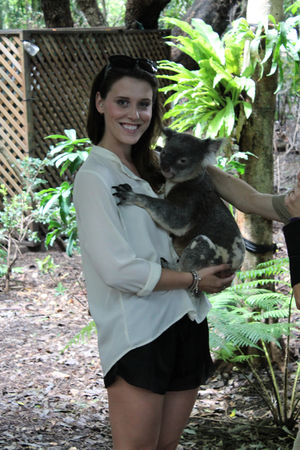Difference between revisions of "A Year In Australia"
From Learnmore
| (10 intermediate revisions by the same user not shown) | |||
| Line 9: | Line 9: | ||
===Accommodation=== | ===Accommodation=== | ||
| − | [[Image:InsideUQ.JPG|thumb| | + | [[Image:InsideUQ.JPG|thumb|250px|left|UQ Campus]] |
Apart from good academic grades, exchange students are also responsible for obtaining accommodation, flights and transport while in Australia. For UK students, there is a travel bursary you can apply for in order to be reimbursed for the costs of flights. UQ will arrange to pick up exchange students from the airport when you first arrive in Brisbane and drop you off at your accommodation, provided you give them at least three days notice with your arrival date and time, and flight details. Accommodation itself is fairly easy to find, and your main decisions lie in whether you choose to live on campus or find separate accommodation. | Apart from good academic grades, exchange students are also responsible for obtaining accommodation, flights and transport while in Australia. For UK students, there is a travel bursary you can apply for in order to be reimbursed for the costs of flights. UQ will arrange to pick up exchange students from the airport when you first arrive in Brisbane and drop you off at your accommodation, provided you give them at least three days notice with your arrival date and time, and flight details. Accommodation itself is fairly easy to find, and your main decisions lie in whether you choose to live on campus or find separate accommodation. | ||
| − | I personally felt a little too old for campus accommodation (and dorms are relatively expensive), so I used UQ’s accommodation website in order to find potential accommodation and contact renters and landlords. It is suggested that you arrange to actually view the properties you are considering once you arrive in Australia before agreeing to rent, so that you can be sure you are getting what is advertised. I was initially pretty apprehensive about doing this, but I booked into a hotel for my first week and set up appointments to view various rental properties in and around campus. It may seem frightening, but it worked out well for me. This way I was able to get a better idea of how the people I would be living with were, how far it was to campus, and what the actual property looked like and included. | + | I personally felt a little too old for campus accommodation (and dorms are relatively expensive), so I used UQ’s accommodation website in order to find potential accommodation and contact renters and landlords. It is suggested that you arrange to actually view the properties you are considering once you arrive in Australia before agreeing to rent, so that you can be sure you are getting what is advertised. I was initially pretty apprehensive about doing this, but I booked into a hotel for my first week and set up appointments to view various rental properties in and around campus. It may seem frightening, but it worked out well for me. This way I was able to get a better idea of how the people I would be living with were, how far it was to campus, and what the actual property looked like and included. |
| − | If renting a room in a house is not necessarily your cup of tea, but you also don’t want to live in campus dorms, you can choose campus-like accommodation. For example, some friends of mine lived in a place called [http://www.uniresort.com.au/ UniResort], which was a quick single bus ride to and from UQ’s campus. It was similar to a dorm, but the accommodation itself had a range of ages and more room than traditional student dorms. Rooms included beds and desks as well as en-suite bathrooms. You booked into your accommodation on a month-by-month basis and were not obligated to find other roommates to fill your apartment once you left. Their accommodation even included a pool! There are a number of places with a similar concept around Brisbane, so you have some options when deciding on appropriate accommodation to | + | I ended up renting a lovely house with three Australians and an American student that was within walking distance of UQ and right near a train station with transport links in to the city; so it could not have worked out better! |
| + | |||
| + | [[Image:Lake.JPG|thumb|250px|right|UQ Campus]] | ||
| + | |||
| + | If renting a room in a house is not necessarily your cup of tea, but you also don’t want to live in campus dorms, you can choose campus-like accommodation. For example, some friends of mine lived in a place called [http://www.uniresort.com.au/ UniResort], which was a quick single bus ride to and from UQ’s campus. It was similar to a dorm, but the accommodation itself had a range of ages and more room than traditional student dorms. Rooms included beds and desks as well as en-suite bathrooms. You booked into your accommodation on a month-by-month basis and were not obligated to find other roommates to fill your apartment once you left. Their accommodation even included a pool! There are a number of places with a similar concept around Brisbane, so you have some options when deciding on appropriate accommodation to suit your individual needs and budget. | ||
===School=== | ===School=== | ||
| − | [[Image:Koala.JPG|thumb| | + | [[Image:Koala.JPG|thumb|left|Making friends in Australia]] |
There are some key differences to schooling at UQ versus City University. To begin with, UQ students undergo midterms as well as final exams. Midterms themselves are graded and count towards your final mark, which I thought was great because it allowed you some opportunity to lessen the pressure of final exams and get a chance to possibly raise your grades in the long run. Midterm formats varied, ranging from traditional closed-book exams, to presentations and academic essays. All were weighted at about 30-40% of my final grade, with the final exam typically counting for about 70%. Final exam formats also varied; one course I took had an academic essay as the final exam, while another was a take home exam in the form of a problem question. Traditional final exams could also be open or closed book, depending on the course. While open book exams may, at first glance, appear to be easier than closed book ones, given the time constrains and expectations that follow from an open book exam, they often ended up feeling quite a bit harder than I initially expected. | There are some key differences to schooling at UQ versus City University. To begin with, UQ students undergo midterms as well as final exams. Midterms themselves are graded and count towards your final mark, which I thought was great because it allowed you some opportunity to lessen the pressure of final exams and get a chance to possibly raise your grades in the long run. Midterm formats varied, ranging from traditional closed-book exams, to presentations and academic essays. All were weighted at about 30-40% of my final grade, with the final exam typically counting for about 70%. Final exam formats also varied; one course I took had an academic essay as the final exam, while another was a take home exam in the form of a problem question. Traditional final exams could also be open or closed book, depending on the course. While open book exams may, at first glance, appear to be easier than closed book ones, given the time constrains and expectations that follow from an open book exam, they often ended up feeling quite a bit harder than I initially expected. | ||
| Line 31: | Line 35: | ||
===The right choice?=== | ===The right choice?=== | ||
| − | [[Image:Bridge.JPG|thumb|250px| | + | [[Image:Bridge.JPG|thumb|250px|right|Andrea, Uncle and Mum on Sydney Harbour bridge]] |
Ultimately, while at first I was incredibly nervous about embarking on this exchange, I think it was one of the best decisions I have made throughout my undergraduate. Landing in Australia was a bit of a shock initially; it was thousands of miles and many an hour away by plane, the time difference was confusing and it was easy to find myself feeling a bit lonely and very distant from friends, family and comfortable surroundings. But it is worth it! You get to experience an entirely new country which, at the time I began my exchange (in February), was in the heat of summer and absolutely beautiful. Living on your own and experiencing new things also helps you to grow and mature as a person, and I felt incredibly proud of myself for following through with it. I had the opportunity to visit South East Asia during my mid-semester break, and took a number of weekend trips (both through student societies at UQ and on my own time), to visit some incredible places - including [http://www.environment.gov.au/parks/uluru/ Uluru] in the Australian Desert and the Great Barrier Reef. It is an incredible country and university, with friendly people and an extremely supportive teaching staff. If you are on the fence about participating in an exchange, I say take the plunge and just do it! You may never have another chance, and it is a decision that has so far proven impossible to regret! | Ultimately, while at first I was incredibly nervous about embarking on this exchange, I think it was one of the best decisions I have made throughout my undergraduate. Landing in Australia was a bit of a shock initially; it was thousands of miles and many an hour away by plane, the time difference was confusing and it was easy to find myself feeling a bit lonely and very distant from friends, family and comfortable surroundings. But it is worth it! You get to experience an entirely new country which, at the time I began my exchange (in February), was in the heat of summer and absolutely beautiful. Living on your own and experiencing new things also helps you to grow and mature as a person, and I felt incredibly proud of myself for following through with it. I had the opportunity to visit South East Asia during my mid-semester break, and took a number of weekend trips (both through student societies at UQ and on my own time), to visit some incredible places - including [http://www.environment.gov.au/parks/uluru/ Uluru] in the Australian Desert and the Great Barrier Reef. It is an incredible country and university, with friendly people and an extremely supportive teaching staff. If you are on the fence about participating in an exchange, I say take the plunge and just do it! You may never have another chance, and it is a decision that has so far proven impossible to regret! | ||
| − | Many thanks to Andrea Mason who graduated in July 2013 | + | ''Many thanks to Andrea Mason who graduated from the LLB at The City Law School in July 2013'' |
[[Category: Newbies]] | [[Category: Newbies]] | ||
[[category:Section 2]] | [[category:Section 2]] | ||
Latest revision as of 09:46, 20 September 2013
Deciding to study abroad is certainly not an easy decision to make. It can be a daunting prospect to uproot yourself from your familiar surroundings, your friends and your family in order to settle yourself into another country for a semester, or even a full year. Yet, the level of personal growth you will experience, and the unforgettable moments you will look back on and cherish make the experience entirely worthwhile.
I am perhaps a bit of an anomaly in that I was already an international student from Canada who had come to the United Kingdom to complete a three-year LLB (Hons) degree, so I had some prior experience in displacing myself and heading to an entirely new country. Going to Australia however, has always been a dream of mine, particularly because it seemed so far away and I was never entirely sure whether I would have another opportunity to travel there for such an extended period of time again. So, I decided in first year that an exchange in my third year was something I definitely wanted to embark upon.
About the Exchange
Australia is a competitive exchange to obtain and you need to ensure that your first and second year marks are good in order to successfully be accepted. My academic tutor suggested aiming for at least a 2:1 average. I chose to go to the University of Queensland (UQ) over the Queensland University of Technology (QUT) because of its slightly better international ranking, but both schools are well regarded and located in the city of Brisbane, Australia’s third largest city. Third-largest city or not, the city itself does not seem exceptionally big, though it does have some sprawling suburbs. UQ’s campus is located just outside of the city centre on beautiful green grounds with lovely old sandstone buildings. QUT is more centrally located, but both are well connected and easy to get to transport-wise.
Accommodation
Apart from good academic grades, exchange students are also responsible for obtaining accommodation, flights and transport while in Australia. For UK students, there is a travel bursary you can apply for in order to be reimbursed for the costs of flights. UQ will arrange to pick up exchange students from the airport when you first arrive in Brisbane and drop you off at your accommodation, provided you give them at least three days notice with your arrival date and time, and flight details. Accommodation itself is fairly easy to find, and your main decisions lie in whether you choose to live on campus or find separate accommodation.
I personally felt a little too old for campus accommodation (and dorms are relatively expensive), so I used UQ’s accommodation website in order to find potential accommodation and contact renters and landlords. It is suggested that you arrange to actually view the properties you are considering once you arrive in Australia before agreeing to rent, so that you can be sure you are getting what is advertised. I was initially pretty apprehensive about doing this, but I booked into a hotel for my first week and set up appointments to view various rental properties in and around campus. It may seem frightening, but it worked out well for me. This way I was able to get a better idea of how the people I would be living with were, how far it was to campus, and what the actual property looked like and included.
I ended up renting a lovely house with three Australians and an American student that was within walking distance of UQ and right near a train station with transport links in to the city; so it could not have worked out better!
If renting a room in a house is not necessarily your cup of tea, but you also don’t want to live in campus dorms, you can choose campus-like accommodation. For example, some friends of mine lived in a place called UniResort, which was a quick single bus ride to and from UQ’s campus. It was similar to a dorm, but the accommodation itself had a range of ages and more room than traditional student dorms. Rooms included beds and desks as well as en-suite bathrooms. You booked into your accommodation on a month-by-month basis and were not obligated to find other roommates to fill your apartment once you left. Their accommodation even included a pool! There are a number of places with a similar concept around Brisbane, so you have some options when deciding on appropriate accommodation to suit your individual needs and budget.
School
There are some key differences to schooling at UQ versus City University. To begin with, UQ students undergo midterms as well as final exams. Midterms themselves are graded and count towards your final mark, which I thought was great because it allowed you some opportunity to lessen the pressure of final exams and get a chance to possibly raise your grades in the long run. Midterm formats varied, ranging from traditional closed-book exams, to presentations and academic essays. All were weighted at about 30-40% of my final grade, with the final exam typically counting for about 70%. Final exam formats also varied; one course I took had an academic essay as the final exam, while another was a take home exam in the form of a problem question. Traditional final exams could also be open or closed book, depending on the course. While open book exams may, at first glance, appear to be easier than closed book ones, given the time constrains and expectations that follow from an open book exam, they often ended up feeling quite a bit harder than I initially expected.
Teaching overall, however, is not much different. While Australia is a different jurisdiction and Australia itself has laws that vary from state to state, it is a Commonwealth country and so it has a legal system that is at least in part based off of the English system. This meant most courses had legal precedent that started out very similar, if not the same to English law, and only a few courses and cases varied. Teachers were always careful to point out where Australian lines of case law diverged, and all of my professors were more than happy to fill me in on any additional information or clarification I felt I needed. I never felt out of my depth, or worried that I could not understand what was different about a particular law and why. I think ultimately if you can learn law in one jurisdiction, you are able to teach it to yourself in any jurisdiction.
The social element
UQ also had an exceptional pro-bono department with great opportunities and very active clubs and societies. Exchange students are also given a lot of attention, with programs geared specifically towards exchange and international students who are new and may not know how to begin meeting people on campus. I would fully recommend that anyone going on exchange get involved in a club or society, as they threw frequent events and it gives you some great opportunities to get to know other UQ students, not just the law faculty. I joined the law, pro-bono and rock climbing society. I was also part of a program called Mates at UQ, which aimed to help people who were new on campus get out there and get involved. Finally I was part of an excellent society called QUEST, which attempts to ensure that exchange and international students experience all that UQ and South East Queensland has to offer. They held frequent pub nights and events, and also organized weekend trips to great tourist locations in and around Brisbane with groups of students just like you.
The right choice?
Ultimately, while at first I was incredibly nervous about embarking on this exchange, I think it was one of the best decisions I have made throughout my undergraduate. Landing in Australia was a bit of a shock initially; it was thousands of miles and many an hour away by plane, the time difference was confusing and it was easy to find myself feeling a bit lonely and very distant from friends, family and comfortable surroundings. But it is worth it! You get to experience an entirely new country which, at the time I began my exchange (in February), was in the heat of summer and absolutely beautiful. Living on your own and experiencing new things also helps you to grow and mature as a person, and I felt incredibly proud of myself for following through with it. I had the opportunity to visit South East Asia during my mid-semester break, and took a number of weekend trips (both through student societies at UQ and on my own time), to visit some incredible places - including Uluru in the Australian Desert and the Great Barrier Reef. It is an incredible country and university, with friendly people and an extremely supportive teaching staff. If you are on the fence about participating in an exchange, I say take the plunge and just do it! You may never have another chance, and it is a decision that has so far proven impossible to regret!
Many thanks to Andrea Mason who graduated from the LLB at The City Law School in July 2013



